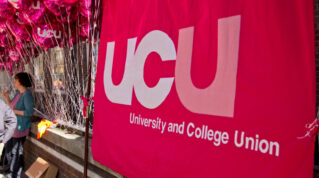Day two of the University and College Union’s flagship annual congress will not go ahead tomorrow due to a walkout by its own staff.
For the first time in the union’s 18-year history, nearly 200 UCU workers, represented by the Unite union, will go on strike after an Acas meeting last Friday failed to reach an agreement over concerns of workplace racism, workplace stress and breaching collective agreements.
Further and higher education policy motions, which set UCU policy for the year, were scheduled for debate at the national congress in Bournemouth tomorrow but will now not go ahead.
FE motions included strategies for campaigns on teacher pay, workload, adult education funding, gender inequality and the new prison education contracts.
In a pre-recorded speech to congress delegates, her first since being re-elected for a second five-year term, general secretary Jo Grady said the ongoing dispute was “very regrettable”.
“We have some challenges and the ongoing dispute with the staff union Unite is very regrettable. I want to ensure every member and all of our staff that we are doing everything possible to get to a better place and reach a settlement.”
UCU told delegates this morning it was “incredibly sorry” that its congress, which will resume and conclude on Friday, would be disrupted and was working on reaching a settlement with Unite.
No events scheduled tomorrow will take place, including an FE sector conference, fringe meetings and an evening conference dinner.
Instead, UCU employees will protest outside the Bournemouth International Centre, where congress is taking place and hold a strike rally inside the nearby Bournemouth Marriott Highcliff Hotel.
Unite’s UCU branch is hosting a “Not the Congress Dinner Disco”, an alternate evening conference dinner for members and UCU delegates.
In early May, nearly three-quarters of the union’s 182 members of Unite voted earlier this week to strike over UCU’s allegedly “shameful” handling of workplace racism and a breach of collective agreements.
“How can they effectively support Black members when they themselves are not being supported?”
A UCU spokesperson said: “UCU met with Unite representatives on Friday 24 May at Acas and again on Wednesday 29 May in Bournemouth. Although a number of proposals were put forward by UCU management during these meetings in response to the issues of dispute, unfortunately no agreement was reached.
“We are ready and willing to continue talks, including further talks at Acas, to find an agreed way forward on the issues at the heart of this dispute. We remain fully committed to finding solutions and working to create the best possible working environment for our staff.”
Unite said it was not opposed to UCU rescheduling the FE and HE conferences once the dispute was settled.
A spokesperson said: “This strike action is a message to our employer that we want real change within UCU. Unite members are deeply disappointed in our employer’s response so far and are angry that our concerns still aren’t being heard. So today we say enough is enough.
“We are resolute in our demands for an anti-racist workplace, for UCU as an employer to honour its collective agreements with us and, for an independent investigation into how the organisation is run. We are determined to bring about the change that UCU staff and UCU members so desperately deserve.”

‘Breakdown in industrial relations’
In an email sent out to delegates this morning, seen by FE Week, UCU detailed a response to each issue that Unite members were balloted on.
The union told delegates in an open letter that it was “100 per cent committed” to resolving the dispute and acknowledged that “there has undoubtedly been a breakdown in industrial relations, that cannot be argued”.
“We know that it is upsetting to attend congress in these circumstances, and this is why we are writing directly to you to outline exactly what has happened in UCU,” the email said, signed by the UCU management team.
UCU bosses said they “firmly reject” the claims made by the Black members group in March over the alleged “disproportionate use” of disciplinary procedures with Black staff.
“The policies we have in place at UCU are robust and crucially, developed and agreed with Unite. We do not use them disproportionately,” they said.
UCU added that the details of the independent review into concerns of racism will be confirmed shortly.
Juliana Ojinnaka, a lecturer at Sheffield College and member of the Black members standing committee said the independent review is “a lot of rhetoric”.
“We’ve heard it all, we’ve worn the t shirt and so on, what we want is action,” she told FE Week on strike day.
“We want Jo Grady to put her money where her mouth is. She signed up for TUC anti racism taskforce. She went through the training, but the reality is that she’s not actually rolled it out within her organisation.”
She added that Black UCU members are more likely to be off sick from “day-to-day racism” in their workplace and union.
“In the workplace, day-to-day racism is going on. [Black staff] are the ones most likely to be observed, most likely to have something written against their name,” she said.
“They’re the ones who are going to be brought in at the last minute to cover classes and so on without adequate preparation. And so you’re facing this in your workplace, but also you’re facing it in your union. When you’re off ill you’re not sure whether you’re off because of the workplace stress or the union stress.
“It’s the same thing that’s happening with the members in Unite. So how can they effectively support Black members when they themselves are not being supported?”
Another accusation brought by Unite was over the formation of a separate union by senior leaders, which breached their recognition agreement with UCU as the sole recognised staff union.
UCU admitted “in hindsight” that it should have formally communicated with Unite over recognising another union branch formed by a “significant minority of our own staff”.
“A significant number of UCU staff chose to leave the Unite branch,” the email reads. “Those staff joined the GMB and requested recognition for staff at their grade, indicating that they would not be rejoining Unite.
“The choice for us therefore as an employer was to recognise their new union, as requested, whilst maintaining every process and agreement in place with the Unite branch, or to ignore a significant minority of our own staff. We could not do that.”
Unite members were also balloted to strike over their employer’s “failure to follow the UCU procedure for organisational change”.
UCU has yet to settle disputes with Unite on a hybrid working policy and a gender identity policy.

















Your thoughts